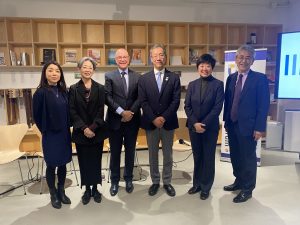2023.Dec.25
REPORTSReport on the B’AI-UTokyo NY Office Event “The Future of Higher Education in the AI Age”
Anna Esaki-Smith (international educational consultant; co-founder, Education Rethink)
・Date: December 14-15, 2023 (EST)
・Venue: On-site (University of Tokyo New York Office) & Online Hybrid
・Language: English
・Organizer: B’AI Global Forum, Institute for AI and Beyond, The University of Tokyo
・Supported by The Institute for AI and Beyond, The University of Tokyo; University of Tokyo New York Office
(Click here for details on the event)
★ A video recording of the event is now available on our YouTube channel.
・Day 1 https://www.youtube.com/watch?v=mnS_FepQFKA&t=0
・Day 2 https://www.youtube.com/watch?v=EjSvIZw3AmE&t=0
★ The article on this event has been published on the Times Higher Education website.
https://www.timeshighereducation.com/blog/universities-must-transform-ensure-no-one-left-behind-era-ai
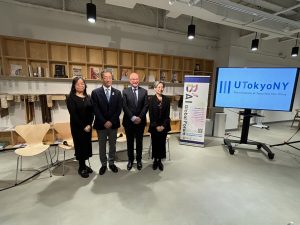
In mid-December, B’AI, UTokyo’s interdisciplinary research group dedicated to the fair and just use of Artificial Intelligence (AI) and other digital technologies, hosted a thought-provoking two-day symposium at the UTokyo New York office, focusing on the profound impact of artificial intelligence on higher education. The event featured a panel of experts with varied backgrounds who delved into the social implications of AI technology and a “fireside chat” with the presidents of the University of Tokyo and Northeastern University about how AI will change how students learn.
Yuko Itatsu, Director, B’AI Global Forum, kicked off the first day with opening remarks about the quickly-evolving environment higher education has entered. “Today we stand on the precipice of an era defined by rapid technological advancements,” she said. “The landscape of higher education is undergoing a profound transformation.” Ai Hisano, an associate professor at UTokyo, followed with a presentation on a collection of essays, Understanding AI in Society: How Technology Exerts Power, published by the University of Tokyo Press in 2023. The book was written from a variety of interdisciplinary perspectives that encouraged the discussion of how AI will influence everyday lives.
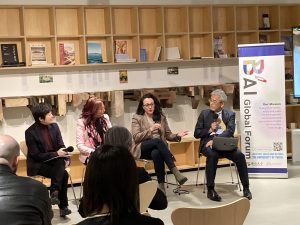
This was followed by “expert talks” from Lauren Goodlad, Professor of English and Comparative Literature at Rutgers University and Julia Stoyanovich, Director for the Center of Responsible AI and an Associate Professor at NYU’s Tandon School of Engineering. Prof. Goodlad spoke about “critical AI literacy,” or the ability to discern the strengths and weaknesses of the technology, while Prof. Stoyanovich mapped out how AI is being used for critical decision-making tasks – such as hiring – and the ethics to be considered as these practices proliferate. A wide-ranging panel discussion that included Yujin Yaguchi, Vice President, Global Education at UTokyo, closed the first day’s activities.
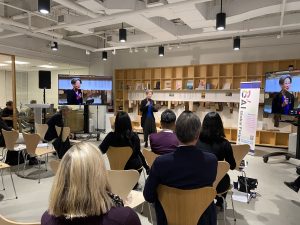
The second day began with introductory remarks by Kaori Hayashi, Executive Vice President, UTokyo, that set the scene for a “fireside chat” discussion with Teruo Fujii, President of the University of Tokyo and Joseph Aoun, President of Northeastern University in Boston, Massachusetts. While the leaders hail from different academic backgrounds – President Fujii in microfluidics and President Aoun in linguistics – they both agreed that AI’s impact on how students learn would be profound.
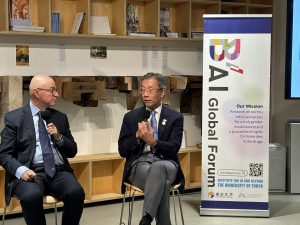
Students were already demanding more interdisciplinary study opportunities, in order to acquire the wide-ranging knowledge necessary to tackle today’s complex challenges. This approach to a university education would become even more important as AI continues to disrupt industries and jobs. The presidents also said faculty would increasingly straddle the worlds of academia and industry, in order keep their expertise current, and that students would need “real life” experiences to apply their knowledge. Lastly, the presidents said universities should look beyond the needs of the traditional youth population. Higher education should open its doors to a wider public and commit to providing lifelong learning in an age of uncertainty and diversification.
Despite the formidable challenges ahead, both leaders expressed confidence in higher education’s potential to shape the future, emphasizing customization, flexibility, and responsiveness to individual and societal needs. By embracing these principles, they believed universities could thrive in the age of AI, contributing to the development of a skilled and adaptable workforce while addressing pressing societal demands.
